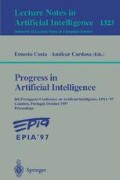Abstract
Qualitative simulation has become a successful method for predicting qualitatively distinct behaviors of physical systems. Yet it is quite weak in providing a global view on a system's behavior, e.g. its stability.
Another approach to reasoning about qualitative properties of dynamic systems is based on Qualitative System Theory of Y. Ishida, deriving global properties of the system from its graphical representation.
This paper presents a Qualitative System Theory based method for fixed point classification in QSIM-like qualitative models and discusses its applicability to qualitative reasoning.
Preview
Unable to display preview. Download preview PDF.
References
Arrowsmith, D. K., Place, C. M.: Ordinary differential equations: A qualitative approach with applications. Chapman and Hall, London New York (1982)
de Kleer, J., Brown, J. S.: Theories of Causal Ordering. Artificial Intelligence 29 (1986)
Ishida, Y., Adachi, N., Tokumaru, H.: Some Results on the Qualitative Theory of Matrix. Trans. of SICE, Vol. 17, No. 1 (1981)
Ishida, Y.: Using Global Properties for Qualitative Reasoning: A Qualitative System Theory. Proceedings IJCAI-89. Morgan Kaufmann, San Mateo, CA (1989)
Ishida, Y.: A Qualitative Analysis on Dynamical Systems: Sign Structure. Memoirs of Kyoto University, Vol. 54, No. 1 (1992)
Ishida, Y.: Structural Analysis on Interval Matrices by Signed Digraph: Determinant Maximization and Singularity. Technical Report NAIST-IS-TR 95032, Nara Institute of Science and Technology, Nara (1995)
Ishida, Y.: Structural Analysis on Interval Matrices by Signed Digraph: Structural Perturbation Principle. Technical Report NAIST-IS-TR 95033, Nara Institute of Science and Technology, Nara (1995)
Kuipers, B. J.: Qualitative Reasoning: Modeling and Simulation with Incomplete Knowledge. MIT Press, Cambridge, MA (1994)
Lee, W. W., Kuipers, B. J.: A Qualitative Method to Construct Phase Portraits. Proceedings of AAAI-93. MIT Press, Cambridge, MA (1993)
Sacks, E.: Hierarchical Reasoning about Inequalities. Proceedings of AAAI-87. Seattle, Wash (1987)
Sacks, E.: A Dynamic Systems Perspective on Qualitative Simulation. Artificial Intelligence 42 (1990)
Takáč, M.: A Qualitative System Theory Based Method for Stability Checking and Its Applicability to Qualitative Reasoning. Diploma thesis, Institute of Informatics, Faculty of Mathematics and Physics, Comenius University, Bratislava (1997)
Weld, D. S.: Comparative Analysis. Artificial Intelligence 36 (1988)
Weld, D. S., de Kleer, J. (eds.): Readings in Qualitative Reasoning about Physical Systems. Morgan Kaufmann, San Mateo, CA (1990)
Author information
Authors and Affiliations
Editor information
Rights and permissions
Copyright information
© 1997 Springer-Verlag Berlin Heidelberg
About this paper
Cite this paper
Takáć, M. (1997). Fixed point classification method for qualitative simulation. In: Coasta, E., Cardoso, A. (eds) Progress in Artificial Intelligence. EPIA 1997. Lecture Notes in Computer Science, vol 1323. Springer, Berlin, Heidelberg. https://doi.org/10.1007/BFb0023927
Download citation
DOI: https://doi.org/10.1007/BFb0023927
Published:
Publisher Name: Springer, Berlin, Heidelberg
Print ISBN: 978-3-540-63586-4
Online ISBN: 978-3-540-69605-6
eBook Packages: Springer Book Archive

